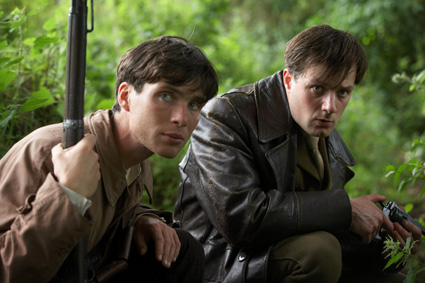FILM-FORWARD.COMReviews of Recent Independent, Foreign, & Documentary Films in Theaters and DVD/Home Video
Directed by: Ken Loach. Produced by: Rebecca O’Brien. Written by: Paul Laverty. Director of photography: Barry Ackroyd. Edited by: Jonathan Morris. Music by: George Fenton. Released by: IFC First Take. Country of Origin: Ireland/UK/Italy/Germany/Spain. 127 min. Not Rated. With: Cillian Murphy, Pádraic Delaney, Liam Cunningham, Orla Fitzgerald, Mary Riordan, Mary Murphy, Laurence Barry, Damien Kearney, Frank Bourke & Myles Horgan.
This communal discussion has as much tension as an earlier ambush of British troops, a barbaric interrogation, and the other brutal humiliations this rural backwater suffers at the hands of the British. To call it a debate may be misleading. The fiery exchanges have such passion the frustrated speakers stumble over their words before immediately firing another retort. Both sides are justified and equally fervent. The Wind That Shakes the Barley is the rare historical drama that lives and breathes with stamina. In the first half, the film’s viewpoint, through the eyes of a recent medical school graduate, is unmistakable. After witnessing the strong-armed and abusive British military harass his community, Damien (Cillian Murphy) has no choice but to join his brother and their childhood friends in the Irish Republican Army. But its perspective fractures in the latter half. It’s not only for the immediacy of the acting that 1920s Ireland feels contemporary. With its depiction of guerilla warfare, of a country under occupation, and the birth pains of forming a new government, comparisons to the war in Iraq are unavoidable, but not because of any direct reference. Wind’s not necessarily for the armchair historian; it’s more gut-wrenching than intellectual. Director Ken Loach, a lucid political storyteller, has a great sense of pace, while screenwriter Paul Laverty lucidly intertwines the historical background (although it would be helpful to be familiar with James Connolly and the partitioning of Northern Ireland.)
It’s a shame this film hasn’t been released earlier. If its opening is to take advantage of tomorrow’s St. Patrick’s Day, it’s an odd choice for a
film that's hardly celebratory, let alone jingoistic. After winning the Golden Palm at last year’s Cannes Film Festival, Wind has already
been released in many international markets. In November, it won a European Film Award for best cinematography. Having missed out on the recent
awards season, it must wade out the next nine months for next year’s, when memories aren’t their freshest. Wind certainly would have posed a
threat to any of the recent best picture Oscar nominees.
Kent Turner
|

 Amidst the horror show of Ireland’s fight for independence, one
remarkable scene stands out among the tense and brutal confrontations. More than half way into the film, a group of County Cork villagers have a
choice: support the 1921 Anglo-Irish Treaty – where Ireland would have self-government, but remain a British dominion and owe allegiance to the
crown – or fight on in a war the British have threatened would be absolute.
Amidst the horror show of Ireland’s fight for independence, one
remarkable scene stands out among the tense and brutal confrontations. More than half way into the film, a group of County Cork villagers have a
choice: support the 1921 Anglo-Irish Treaty – where Ireland would have self-government, but remain a British dominion and owe allegiance to the
crown – or fight on in a war the British have threatened would be absolute.